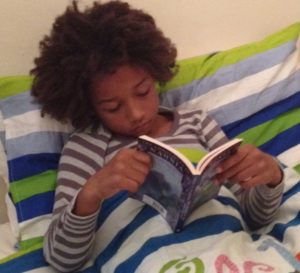
One of our readers asked us:
‘How about tips to help children move on from reading aloud to reading in their heads? When they can do this the world of reading really opens up, but I can’t find much written about the process.’
First all why might young children read out loud?
- Reading out loud is a natural, and helpful stage for many children when they first start to read, generally between 4 and 6. Children move beyond this stage with experience and as the process becomes less laborious for them.
- When learning to speak, toddlers think out loud before thinking silently. Even as adults, when doing something challenging it helps to provide a running commentary as you do so for example, adding numbers out loud.
- Reading is a complex skill, there are many processes involved and for young children these processes will not have been internalised, so reading out loud can be helpful to them.
- In fact, hearing a child read out loud to themselves can provide an interesting insight into the strategies they are using to approach unfamiliar words.
- Reading silently does enable children to read quickly, focusing on comprehending and engaging with the text rather than concentrating on how to pronounce individual words. So are there ways you can help your child develop this skill? Here are our thoughts which may be helpful for parents reading with their child at home and also for teachers, teaching assistants or volunteers in school settings reading one to one or with groups.
See this blog post with some interesting thoughts on the topic:
Here are some tips
- Make sure your child sees you, other adults or older children reading books or other texts silently, this will give them a model for their own reading behaviour.
- Talk to children about reading silently or ‘in your head’ and explain how you do it – many children don’t know what adults do when they read silently, that you don’t have to read the words aloud, you can ‘think’ the words or ‘listen’ to the voice in your head reading them. Children may think that reading means reading out loud – if their experience of reading so far has been to read to an adult or listening to adults reading to them.
- From very early stages make sure children have lots of opportunity to look at books on their own, browse new books, revisit familiar ones and read the pictures.
- Ensure children have a range of strategies to tackle unfamiliar words so that they are not reliant on phonic approaches, they need to begin to recognise whole words and use the context of the story and the picture cues to work out unknown words as well.
- Read to your child regularly including books they will go onto read themselves. They will have your voice in their heads when they return to the same book and try to decode the words themselves.
- Ask your child to picture a scene or a character in their heads when listening to an adult read to them.
- When reading with your child ask them to read the next page or next section in their heads, then talk about it – what they have just read and what it was like to read in their heads.
- Practise searching for information in a book or online together – quickly looking over a text to find a key word – you could show them how to do this then encourage your child to have a go. You could make this into a game or competition – who can find a particular word fastest.

 Follow lovemybooksUK15
Follow lovemybooksUK15